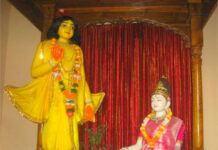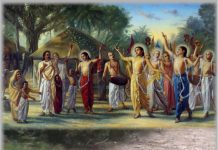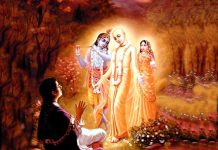Continued from previous page… Purports to Mantra 5 ends on this page. Mantra 6 starts with describing maha-bhagvata devotees of the Supreme Lord.

When the child saint Prahlada Maharaja was in the presence of his atheist father, his father asked him, “Where is your God?” When Prahlada replied that God resides everywhere, the father angrily asked whether his God was within one of the pillars of the palace, and the child said yes. At once the atheist king shattered the pillar in front of him to pieces, and the Lord instantly appeared as Nrisimha, the half-man, half-lion incarnation, and killed the atheist king. Thus the Lord is within everything, and He creates everything by His different energies. Through His inconceivable powers He can appear at any place in order to favor His sincere devotee.
Lord Nrisimha appeared from within the pillar not by the order of the atheist king but by the wish of His devotee Prahlada. An atheist cannot order the Lord to appear, but the Lord will appear anywhere and everywhere to show mercy to His devotee. The Bhagavad-gita (4.8) similarly states that the Lord appears in order to vanquish nonbelievers and protect believers. Of course, the Lord has sufficient energies and agents who can vanquish atheists, but it pleases Him to personally favor a devotee. Therefore He descends as an incarnation. Actually, He descends only to favor His devotees and not for any other purpose.
In the Brahma-samhita (5.35) it is said that Govinda, the primeval Lord, enters everything by His plenary portion. He enters the universe as well as all the atoms of the universe. He is outside in His virat form, and He is within everything as antaryami. As antaryami He witnesses everything that is going on, and He awards us the results of our actions as karma-phala. We ourselves may forget what we have done in previous lives, but because the Lord witnesses our actions, the results of our actions are always there, and we have to undergo the reactions nonetheless.
The fact is that there is nothing but God within and without. Everything is a manifestation of His different energies, like the heat and light emanating from a fire, and in this way there is a oneness among His diverse energies. Although there is oneness, however, the Lord in His personal form still enjoys unlimitedly all the pleasures enjoyed minutely by the tiny part-and-parcel living entities.
MANTRA 6
TRANSLATION. He who sees systematically everything in relation to the Supreme Lord, who sees all living entities as His parts and parcels, and who sees the Supreme Lord within everything never hates anything or any being.
PURPORT. This is a description of the maha-bhagavata, the great personality who sees everything in relation to the Supreme Personality of Godhead. The Supreme Lord’s presence is realized in three stages. The kanishtha-adhikari is in the lowest stage of realization. He goes to a place of worship, such as a temple, church or mosque, according to his religious faith, and worships there according to scriptural injunctions. Devotees in this stage consider the Lord to be present at the place of worship and nowhere else. They cannot ascertain who is in what position in devotional service, nor can they tell who has realized the Supreme Lord. Such devotees follow the routine formulas and sometimes quarrel among themselves, considering one type of devotion better than another. These kanishtha-adhikaris are actually materialistic devotees who are simply trying to transcend the material boundary to reach the spiritual plane.
Those who have attained the second stage of realization are called madhyama-adhikaris. These devotees observe the distinctions between four categories of being: (1) the Supreme Lord; (2) the devotees of the Lord; (3) the innocent, who have no knowledge of the Lord; and (4) the atheists, who have no faith in the Lord and hate those in devotional service. The madhyama-adhikari behaves differently toward these four classes of person. He adores the Lord, considering Him the object of love; he makes friends with those who are in devotional service; he tries to awaken the dormant love of God in the hearts of the innocent; and he avoids the atheists, who deride the very name of the Lord.
(To continue read the next page…)
Source: Sri Isopanishad. Translation and purports by His Divine Grace A.C.Bhaktivedanta Swami Prabhupada. Copyright BBT International http://www.vedabase.com/en/iso

























